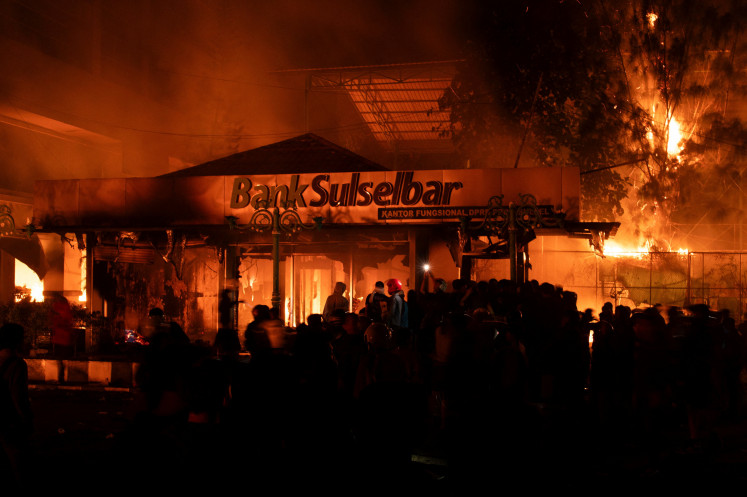Popular Reads
Top Results
Can't find what you're looking for?
View all search resultsPopular Reads
Top Results
Can't find what you're looking for?
View all search resultsRI operators gear up for ASEAN Open Skies Policy
ASEAN Open Skies Policy, one of the components in the groupingâs economic integration, is set to be implemented in 2015 to boost air connectivity in the region
Change text size
Gift Premium Articles
to Anyone
A
SEAN Open Skies Policy, one of the components in the grouping's economic integration, is set to be implemented in 2015 to boost air connectivity in the region.
Air connectivity is expected to bring down barriers to trade, facilitate changes, ease the flow of labor and boost leisure travel ' things considered essential given the fact that tourism is a major stimulus for growth for several ASEAN members.
Indonesian operators are gearing up by procuring brand new planes, improving services and maintenance centers and developing their human resources in order to capture the opportunities in the region's 600 million population market.
National flag carrier Garuda Indonesia will operate 154 aircraft with an average fleet age of five years by 2015 and strengthen its network in Southeast Asia.
'We have plans to enter points that we have not entered, such as the Philippines and Brunei [Darussalam], in the near future to anticipate the Open Skies Policy,' Garuda vice president communications Pujobroto told The Jakarta Post.
Apart from the fleet, the firm plans to build four new hangars over the next five years through its subsidiary GMFAeroAsia to help support the carrier's expansion.
Pujobroto said Garuda was confident it could compete with other carriers that currently had stronger networks in ASEAN, such as Singapore Airlines and Malaysia Airlines, which had code-share agreements with 11 international airlines like Etihad Airways and China Airlines, connecting them to points across the globe including ASEAN.
'We will also join the SkyTeam next year, which will give us a firm foothold in international networks. One of the members is Vietnam Airlines. [Hopefully] we can work together to tap into the potential ASEAN market,' he went on.
SkyTeam is a global airline alliance with 19 member airlines flying to more than 1,000 destinations.
Another domestic player ready to enter the fierce Open Skies is the Lion Group with its low-cost carrier Lion Air, full service Batik Air and Malindo Airways ' a joint-venture airline with Malaysia's National Aerospace and Defense Industries (NADI).
The Lion Group has ordered 230 Boeing B737s and 234 Airbus aircraft consisting of A320s Neo and A321s, with the first delivery expected in 2015.
The group has also prepared hangars and maintenance centers in Batam, Riau Islands, and in Manado, North Sulawesi, to accommodate its expansion.
'We're also developing our human resources, not only pilots but also the ground staff and engineers,' Lion general affairs director Edward Sirait told the Post, adding that the firm was expanding its schools and training centers in Banten, West Java and Central Kalimantan.
'They are very important because they will manage every aircraft and every production tool that we order.'
Indonesia has committed to opening or expanding five international airports by 2015: Soekarno-Hatta in Jakarta; Kuala Namu in Medan, North Sumatra; Ngurah Rai in Denpasar, Bali; Juanda in Surabaya, East Java; and Sultan Hasanuddin in Makassar, South Sulawesi.
State-run airport operators Angkasa Pura I and Angkasa Pura II are also upgrading 24 commercial airports nationwide, including a monster expansion project worth US$756 million at the country's main gateway, Soekarno-Hatta International Airport.
The upgrading of Juanda and Ngurah Rai Airports is expected to finish later next year and Soekarno-Hatta next year.
Transportation Ministry spokesman Bambang S. Ervan said that Indonesia should not worry about being a market in ASEAN, citing a cabotage policy that protected point-to-point within the country.
'And if they want to enter other [domestic] airports, such as those in Aceh or Palembang [South Sumatra], they need to forge bilateral air service agreements,' he said.
The Open Skies concept lies in policy reforms such as the removal of route capacity regulations and price controls, to promote competition and an array of choices in the aviation industry that will benefit passengers within member states: Indonesia, Singapore, Malaysia, Brunei Darussalam, Thailand, Philippines, Laos, Cambodia, Vietnam and Myanmar.
The policy will be implemented gradually with a realization target of full liberalization in 2020.










